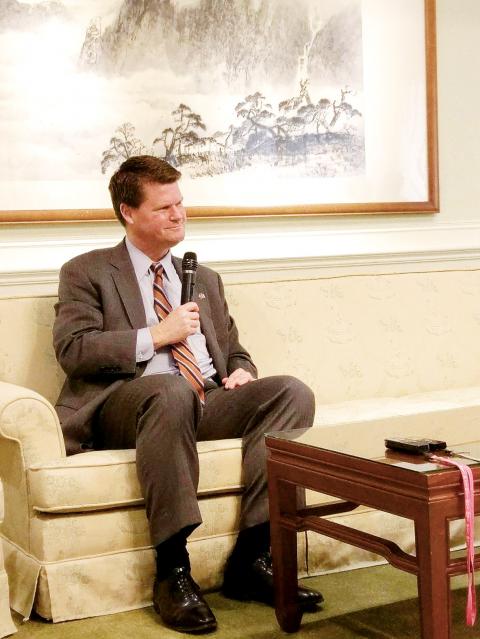The chance of US President Donald Trump and Chinese President Xi Jinping (習近平) signing a fourth US-China communique when they meet next month is very unlikely, a former US Department of State official said yesterday in Taipei.
“The information I have is that there is no plan for a fourth communique, so I don’t expect they will produce one in this meeting,” former US deputy assistant secretary of state for East Asian and Pacific Affairs Randall Schriver said.
Schriver, who now serves as president of the Project 2049 Institute, a US think tank focusing on security issues in Asia, said that while he expects that Trump and Xi would talk about the US’ “one China” policy during their meeting, the US president is likely to also underscore the importance of the Taiwan Relations Act (TRA) and the “six assurances.”

Photo: Lu Yi-hsuan, Taipei Times
He also expressed the hope that any conclusions of the Trump-Xi meeting would include “all the right things” about Taiwan and Washington’s important relationship with Taipei.
The three joint communiques — the Shanghai one of 1972, the one establishing diplomatic relations in 1978 and the one from 1982 — have provided the basic framework for Washington’s relations with Beijing since then-US president Richard Nixon’s historic visit to China in 1972.
The TRA came into force in 1979. Three years later, then-US president Ronald Reagan issued what were later known as the “six assurances” to ensure Taiwan that it would not be abandoned.
Turning to Taiwan’s national security, Schriver said having watched closely the Chinese People’s Liberation Army’s (PLA) modernization, he believes the US should assist in making weapons more available to Taiwan to address its security needs.
However, Schriver dismissed the possibility of the US also deploying to Taiwan a Terminal High-Altitude Area Defense system (THAAD), a system that recently arrived in South Korea, angering China.
Saying he was not aware of such a plan, Schriver said that Taiwan faces different threats in terms of ballistic and cruise missiles compared with South Korean and US forces in South Korea or Japan.
“I am not a technical expert, but I don’t know that THAAD would even be the appropriate system for Taiwan and Taiwan security needs,” Schriver said.
However, there is a need to think about strong missile defense and protection for Taiwan given the missile threats it faces, he said.
Presidential Office spokesman Sidney Lin (林鶴明) said the government will closely watch any developments regarding the Trump-Xi meeting, adding: “The US is Taiwan’s most important ally… As a member of the international community, we will continue to develop a stronger partnership with Washington in the hope of jointly contributing to regional peace, stability and welfare.”

Alain Robert, known as the "French Spider-Man," praised Alex Honnold as exceptionally well-prepared after the US climber completed a free solo ascent of Taipei 101 yesterday. Robert said Honnold's ascent of the 508m-tall skyscraper in just more than one-and-a-half hours without using safety ropes or equipment was a remarkable achievement. "This is my life," he said in an interview conducted in French, adding that he liked the feeling of being "on the edge of danger." The 63-year-old Frenchman climbed Taipei 101 using ropes in December 2004, taking about four hours to reach the top. On a one-to-10 scale of difficulty, Robert said Taipei 101

Nipah virus infection is to be officially listed as a category 5 notifiable infectious disease in Taiwan in March, while clinical treatment guidelines are being formulated, the Centers for Disease Control (CDC) said yesterday. With Nipah infections being reported in other countries and considering its relatively high fatality rate, the centers on Jan. 16 announced that it would be listed as a notifiable infectious disease to bolster the nation’s systematic early warning system and increase public awareness, the CDC said. Bangladesh reported four fatal cases last year in separate districts, with three linked to raw date palm sap consumption, CDC Epidemic Intelligence

US climber Alex Honnold left Taiwan this morning a day after completing a free-solo ascent of Taipei 101, a feat that drew cheers from onlookers and gained widespread international attention. Honnold yesterday scaled the 101-story skyscraper without a rope or safety harness. The climb — the highest urban free-solo ascent ever attempted — took just more than 90 minutes and was streamed live on Netflix. It was covered by major international news outlets including CNN, the New York Times, the Guardian and the Wall Street Journal. As Honnold prepared to leave Taiwan today, he attracted a crowd when he and his wife, Sanni,

Taiwanese and US defense groups are collaborating to introduce deployable, semi-autonomous manufacturing systems for drones and components in a boost to the nation’s supply chain resilience. Taiwan’s G-Tech Optroelectronics Corp subsidiary GTOC and the US’ Aerkomm Inc on Friday announced an agreement with fellow US-based Firestorm Lab to adopt the latter’s xCell, a technology featuring 3D printers fitted in 6.1m container units. The systems enable aerial platforms and parts to be produced in high volumes from dispersed nodes capable of rapid redeployment, to minimize the risk of enemy strikes and to meet field requirements, they said. Firestorm chief technology officer Ian Muceus said